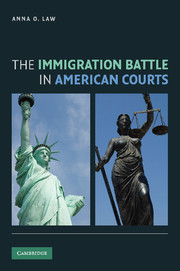Book contents
- Frontmatter
- Contents
- List of Tables and Figures
- Acknowledgments
- 1 Introduction
- 2 How Do We Know What We Know? Data, Methods, and Initial Findings
- 3 The Rise of Two Courts with Differentiated Functions
- 4 Interstitial Policy Making in the U.S. Courts of Appeals
- 5 Institutional Growth and Innovation: The Ninth Circuit Court of Appeals and Immigration
- 6 Continuity Amid Change: The Federal Courts' Commitment to Due Process
- 7 Conclusion
- Appendix A Further Elaboration of Case Selection Methods
- Appendix B Further Elaboration on the Search for Modes of Legal Reasoning
- Appendix C Numerical Codes for Modes of Legal Reasoning
- Appendix D Interview Questions
- Index
- References
2 - How Do We Know What We Know? Data, Methods, and Initial Findings
Published online by Cambridge University Press: 04 August 2010
- Frontmatter
- Contents
- List of Tables and Figures
- Acknowledgments
- 1 Introduction
- 2 How Do We Know What We Know? Data, Methods, and Initial Findings
- 3 The Rise of Two Courts with Differentiated Functions
- 4 Interstitial Policy Making in the U.S. Courts of Appeals
- 5 Institutional Growth and Innovation: The Ninth Circuit Court of Appeals and Immigration
- 6 Continuity Amid Change: The Federal Courts' Commitment to Due Process
- 7 Conclusion
- Appendix A Further Elaboration of Case Selection Methods
- Appendix B Further Elaboration on the Search for Modes of Legal Reasoning
- Appendix C Numerical Codes for Modes of Legal Reasoning
- Appendix D Interview Questions
- Index
- References
Summary
The answer to the question of whether there is any difference in the way the U.S. Courts of Appeals or the U.S. Supreme Court treat immigration cases is very much dependent on how one measures the result. How do we know what we know? One way to go about answering the question is to compare the rate at which aliens prevail in their legal challenges in each level of the courts. But to ask whether aliens typically win or lose at the Supreme Court or the Courts of Appeals is to focus only on the legal outcome of a case, and such a focus is highly misleading because it glosses over the motivations for the decision. One realizes what the judges and justices have decided without gaining much understanding of why they decided the way they did. Moreover, given the fact that the Supreme Court and Courts of Appeals use different case selection mechanisms, and have different degrees of control over their dockets, comparing the legal outcomes of the two courts is not very meaningful. This chapter proposes refocusing the inquiry to better understand how the Supreme Court and Courts of Appeals decide immigration cases in comparable ways in order to obtain a fuller assessment of what is happening to aliens' appeals in these two levels of the federal courts. The methodological approaches adopted are crucial, and for this reason the discussion of methodology in this chapter, and especially in the appendices, is fairly detailed.
- Type
- Chapter
- Information
- The Immigration Battle in American Courts , pp. 19 - 53Publisher: Cambridge University PressPrint publication year: 2010



